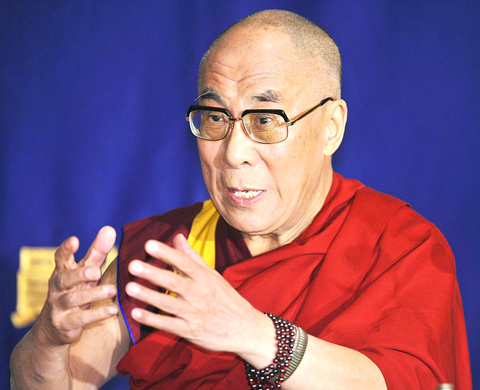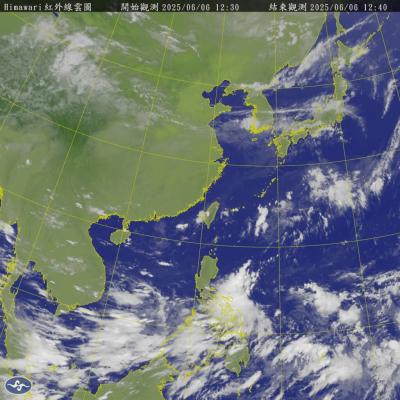Liberty Times: If you compare your first two visits to Taiwan [in 1999 and 2001] with this visit, do you feel that Taiwan has changed? Was there anything that left a particularly deep impression?
Dalai Lama: The main difference between this and the previous two visits was that this visit was the result of an invitation from the typhoon-disaster areas. I came to pray for the disaster areas, so this was a different experience. Personally, I felt sadness after arriving in the disaster area. On the other hand, I was able to travel to Taiwan and to pray with fellow believers and [Buddhist] masters. From this perspective, I also felt quite happy.

PHOTO: AFP
In the beginning, when I had just arrived in Taiwan, some media outlets were a bit hesitant and there were also some negative reports and some protests [laughs]. On one hand, I felt that these protesters were a bit silly, but on the other hand, they made me happy because they were able to take advantage of Taiwan’s freedoms. Afterwards, I told them it would be even better if they could bring that freedom to China [laughs].
A few days after I arrived in Taiwan, media coverage became more and more positive, maybe because they understood better why I was there. After I returned to India, [a representative of] Taiwan’s Mainland Affairs Council said in a public talk that “the Dalai Lama’s visit had no impact on cross-strait relations.” I felt comforted and happy to hear that.
LT: In the past, politicians rushed to meet you, but this time they all avoided you. What do think about that? Do you feel the atmosphere in Taiwanese society has changed?
DL: I didn’t feel there was anything strange about it and I didn’t think there were any surprises. Cross-strait relations have been strengthened lately and because of this, Taiwan has also received some concrete benefits. In addition to economic benefits, the public’s fear of the Chinese Communist Party (CCP) has also been somewhat alleviated. For example, China’s firing missiles at Taiwan, that used to be one fear, but that is also disappearing gradually.
Politicians, of course, we all know that politicians have their concerns because they want to protect their own interests and to strengthen cross-strait ties, and I can understand that.
LT: Some people in Taiwan have grown even more fearful of the current situation and they feel China wants to speed up the annexation of Taiwan and that President Ma Ying-jeou’s (馬英九) administration keeps talking up China. Do you have any advice on the Taiwan government’s cooperation with the CCP and their exchanges?
DL: I’ve said all along that Taiwan’s future should be decided by the Taiwanese people, so those Taiwanese that you just mentioned, those who are more concerned because of these exchanges, they should make themselves heard in public. They should also mention this in public debates. The public must discuss these things, this is very important.
Often when I meet with foreign friends, whether they are in government or non-governmental organizations, whether in the US or in Europe, I repeatedly tell them that it is very important to build a special relationship between Taiwan and China, but when building this special relationship, they must protect Taiwan’s democracy. This is a necessity. I also tell these people from free countries that protecting Taiwan’s democracy and freedom is the duty of their countries. I say this repeatedly.
LT: Because countries place economic concerns and national interests first, they tend to use “selective democracy.” For example, at any given moment, they keep their distance from the Dalai Lama. Simply put, every country around the world has to take note of what China does when they decide whether or not to meet with you, or with exiled Uighur leader Rebiya Kadeer. Do you feel this is a matter of democratic regression amid civilizational progress?
DL: Many things that occur in the world are good, and many of these things are interconnected and interrelated. There is a Buddhist principle of cause and effect, which says that one event or one thing is connected to many other things and events. These are complicated, very complicated matters [laughs]. I believe this should be discussed in public by experts and academics from different fields, and they should publish articles and engage in dialogue and multifaceted debate. This is very important.
Economic issues are in fact a practical issue, but if we look at it from the perspective of fundamental interests, I feel that a comparison between economic and democratic interests shows that democratic interests are more important. Without democracy, the economy is useless. With democracy, there will be more important developments. Without democracy, there might not be any room for innovation. Without this room for innovation and creativity, economic and cultural development may be faced with even more bottlenecks because in non-democratic states and regions, power is concentrated in the hands of the central government.
LT: When you came to Taiwan, you talked about your hopes that Taiwan will have an impact on Chinese democracy, but even the US is forced to bow its head when dealing with China. Despite your insistence on a peaceful and non-violent approach and the fact that you have held talks with China on 17 occasions, China’s armed police last year suppressed the Tibetan people in a tragic and bloody event. Do you still trust the CCP? On what reasoning do you base the view that the CCP’s totalitarianism may be relaxed and that China one day may move toward liberal democracy?
DL: It is not an impossibility that the CCP dictatorship will be able to resolve the Tibet issue. It is possible to find things that are in the interests of both parties. We are working hard, but if China were to democratize, maybe the Tibet issue could be quickly and easily resolved. We have met recently with Chinese intellectuals, academics and experts. They all have an enlightened outlook and take a rational view of the Tibet issue. There is currently quite a lot of leeway and that would have been impossible 30 or 40 years ago. At that time, no one dared meet with me and if someone did come, they may well have ended up in a labor camp after they returned [laughs]. That means [the situation] is constantly changing.
In the year since the incident in Tibet, I have met with more than 300 Chinese academics, authors and intellectuals in China and overseas, in Europe, the US and Dharamsala. They all support my advocacy of Tibetan autonomy as the just and middle way. In more than a year since March last year, there have been more than 700 Chinese articles supporting Tibet, some even supporting Tibetan independence.
LT: Is that more than you ask for?
DL: Yes, that falls outside the scope of what I am asking for.
LT: Since the day you were born, you have never had the opportunity to choose your own life. Have you ever thought about what you would have been if you had not been born the reincarnation of the Dalai Lama?
DL: Since I am the Dalai Lama, I am the Dalai Lama. I never thought of anything else. I have three tasks in this life. One is to increase human benevolence, one is to promote harmony between religions. I will do all I can as long as I am alive in regard to these two tasks. The third task is that because I am Tibetan, and because I am the Dalai Lama, I therefore have the duty and the responsibility to speak for the Tibetan people, but because beginning in 2001, the premier of the government in exile has been elected in direct elections, I can now say that in this respect, I am in semi-retirement.
The interview was conducted for the Liberty Times (the Taipei Times’ sister paper) in English and back-translated from Chinese.

STAY AWAY: An official said people should avoid disturbing snakes, as most do not actively attack humans, but would react defensively if threatened Taitung County authorities yesterday urged the public to stay vigilant and avoid disturbing snakes in the wild, following five reported snakebite cases in the county so far this year. Taitung County Fire Department secretary Lin Chien-cheng (林建誠) said two of the cases were in Donghe Township (東河) and involved the Taiwan habus, one person was bit by a Chinese pit viper near the South Link Railway and the remaining two were caused by unidentified snakes. He advised residents near fields to be cautious of snakes hiding in shady indoor areas, especially when entering or leaving their homes at night. In case of a

A tropical disturbance off the southeastern coast of the Philippines might become the first typhoon of the western Pacific typhoon season, the Central Weather Administration (CWA) said. The system lacks a visible center and how it would develop is only likely to become clear on Sunday or Monday, the CWA said, adding that it was not yet possible to forecast the potential typhoon's effect on Taiwan. The American Meteorological Society defines a tropical disturbance as a system made up of showers and thunderstorms that lasts for at least 24 hours and does not have closed wind circulation.

ENERGY RESILIENCE: Although Alaska is open for investments, Taiwan is sourcing its gas from the Middle East, and the sea routes carry risks, Ho Cheng-hui said US government officials’ high-profile reception of a Taiwanese representative at the Alaska Sustainable Energy Conference indicated the emergence of an Indo-Pacific energy resilience alliance, an academic said. Presidential Office Secretary-General Pan Men-an (潘孟安) attended the conference in Alaska on Thursday last week at the invitation of the US government. Pan visited oil and gas facilities with senior US officials, including US Secretary of the Interior Doug Burgum, US Secretary of Energy Chris Wright, Alaska Governor Mike Dunleavy and US Senator Daniel Sullivan. Pan attending the conference on behalf of President William Lai (賴清德) shows a significant elevation in diplomatic representation,

Credit departments of farmers’ and fishers’ associations blocked a total of more than NT$180 million (US$6.01 million) from being lost to scams last year, National Police Agency (NPA) data showed. The Agricultural Finance Agency (AFA) said last week that staff of farmers’ and fishers’ associations’ credit departments are required to implement fraud prevention measures when they serve clients at the counter. They would ask clients about personal financial management activities whenever they suspect there might be a fraud situation, and would immediately report the incident to local authorities, which would send police officers to the site to help, it said. NPA data showed